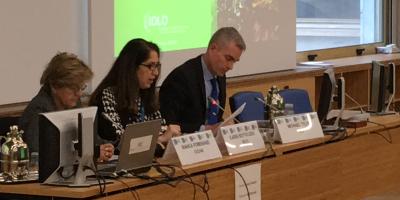
‘Policies, laws and fair justice systems play a crucial role in making sure that women have equal access to land and productive resources,’ Ilaria Bottigliero, IDLO Director of Research & Learning, told participants during a panel discussion on the topic of ‘Land, gender and food security: the rule of law as an enabler’.
‘In order to achieve food security we must not only ensure the availability of adequate food. It’s primarily about eradicating systemic barriers that lead to the unequal production, procurement and distribution of food,’ she added.
Bianca Pomeranzi, a member of the Committee on the Elimination of Discrimination against Women (CEDAW) and Senior Gender Advisor at the Italian Ministry of Foreign Affairs and International Cooperation, highlighted the importance of monitoring the effects of laws on changing discriminatory attitudes towards women.
‘All laws should promote and protect the human rights of women. But it is quite difficult to understand how those laws are being implemented,’ said Ms. Pomeranzi. ‘We need to implement progressive solutions, but it’s difficult because the worlds of human rights and development take different approaches. The concept of the rule of law can be helpful in bridging these differences.’
Mike Taylor, President of the Secretariat of the International Land Coalition, underlined justice as the ‘non-negotiable center of development’. He described projects in India, Togo and Nepal, which are using different approaches to achieve women’s land rights – all based on the idea that change is brought about by getting people to work together.
Mr. Taylor emphasized that ‘rule of law and legal recognition are the critical first step. But the change we need isn’t just a question of putting a signature on paper. It’s a process that must involve all stakeholders.’
Participants posed questions to the panel about the interaction between formal and informal legal systems, the effect of community tenure on women’s rights, and how best to link up justice solutions with other issues affecting women, such as health, nutrition and education.
In response to a question about what steps organizations are taking to involve future generations in efforts to promote gender equality, Dr. Bottigliero acknowledged the central role of young people as agents of change. ‘We need to recognize the role of youth not as a beneficiary, but as a stakeholder. There is huge potential for making change work at the local level by mobilizing young people.’
During the event, IDLO presented its ‘Women, Food, Land: Exploring Rule of Law Linkages’ policy brief, which examines key challenges posed by rule of law issues that affect women’s food security and land rights – such as inadequate laws and policies, implementation failures and barriers to accessing justice – and suggests ways in which rule of law interventions might seek to overcome these.
The discussion took place at a side event organized by IDLO and the Italian Mission to the International Organizations in Rome during the 43rd session of the Committee on World Food Security (CFS).


